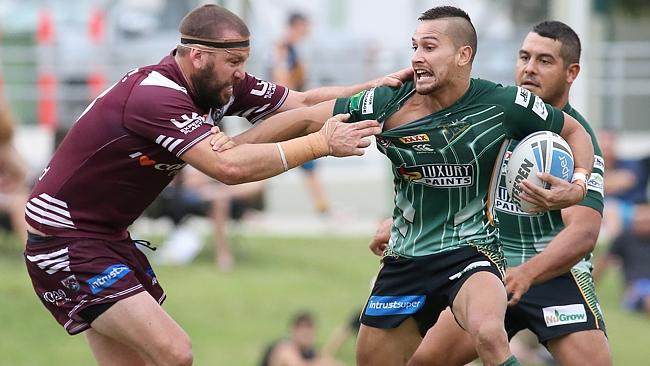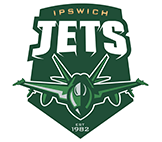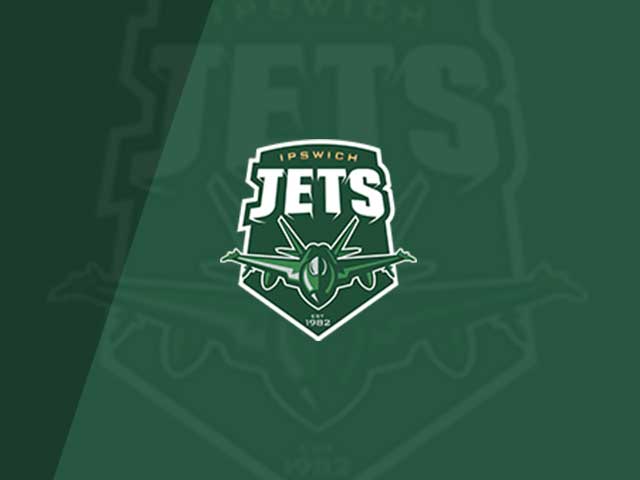THE Ipswich Jets, in the Queensland Cup, are about to change the way rugby league is played.
The Jets do not use block plays, an attacking move used ad nauseam among all 16 NRL clubs right now.
They never wrestle in defence. Indeed, they prefer to let their opposition have quick play-the-balls, again in direct contrast to the NRL way.

Marmin Barba of the Ipswich Jets tries to get past a tackle. Pic Jono Searle.
They kick-off short every time instead of driving the ball deep for a big front-rower to hit it up against them.
CHANGES: NRL to scrap round 13 rule
Every dropout is also short, even though it leaves teams attacking their tryline.
They don’t care about completion rates. They sometimes run backwards and often run sideways, with the full blessing of their coaches Ben and Shane Walker.
Whatever is considered standard thinking in the NRL there is a fair chance the Jets do the opposite.
But here’s the thing: despite spending about a third on their salaries as what North Queensland Cowboys feeder club, the Townsville Blackhawks, do, which naturally suggests their talent is not as deep, and despite playing a form of football that is the total opposite of the considered way to play in the NRL, the Jets share the competition lead.
And they are the most exciting team in the competition.
So you have to ask yourself the question: are the Jets so successful despite the way they play, or because of it?
“We play a very different style to anyone, anywhere,” Ben Walker said.
Along with his brother Shane, the Walkers have gone back to what renowned Toowoomba coach Duncan Thompson called “contract football”.
The entire coaching philosophy is deliberate.
The Jets are coached this way. More, the Walker brothers are turning conventional thinking upside down.
The golden rule to the Jets’ success is not completion rates, which every NRL coach quotes in his post-match press conference, but time in possession.

Ipswich Jets Co Coaches and brothers, Ben & Shane Walker. Photo David Kapernick
“The completion one is an interesting one,” Ben says.
“I’ve gone back through the years and done completions for every team for every game. I did this two years ago when we started using this style.
“Cronulla, one year, had the highest completion rate for the season but they ran, it might have been, second last.
“You don’t win games by completing sets.”
Of far greater importance, Walker says, is time with the ball.
“That is the only stat that we worry about other than the scoreboard,” he says.
It sounds far too basic, but the Walker brothers have identified the other truth.
They know teams fatigue far quicker defending rather attacking, long considered a rugby league
In fact, it’s why most coaches cite “completions” as a determining factor in the result.
But it is time, not completions, that is the biggest
Let’s take a look at the recent Origin game in Sydney, which most believe was a dour, if intense, contest, where precious little football was played as both teams worked through their sets.
NSW finished the game with a staggering 91 per cent completion rate. This is nearly enough to win two football games.
Queensland was not far behind at 85 per cent.
Importantly, though, Queensland came out on top in time in possession, 54 per cent to 46 per cent.
And had the ball in their hand at the end when it came time to win it.
“That’s why I don’t care if I see our guys running backwards or sideways, as long as we’ve got the ball there’s not much chance of them scoring.”

Jets’ Chris Walker scores try. Pic Glenn Barnes
It’s why the Walker brothers got rid of their wrestling coach four years ago, just a season into the job.
Wrestling, they realised, was counterproductive to what they were trying to achieve.
Last weekend the Jets tackled a Souths Logan player just off his tryline. They jumped up quickly and let him play the ball.
“It enables the opposition to roll through the set really quickly,” Walker says.
“They have five hit-ups and kick to our corner and think they’ve had a good set.
“The reality is they’ve rolled through in 30 seconds and then we get it and we hold on to it for a minute or more.
“So we’re encouraging quick play-the-balls against us.”
Eventually, Walker says, the opposition’s lungs go first. And then they come at them with angles and second phase play that takes advantage of the fatigued defence.
The Walkers also see kick restarts differently.
Daly Chery-Evans waiting on final offer from Manly Sea Eagles

Advertisementx
Most kick-offs, he says, go deep for a front-rower to return, where he usually makes it to the 20m line. The Jets kick short and contest the ball.
“If we don’t get it back they get tackled 35m off the tryline,” he says.
“So we’re losing only 15m but we’re better than a 50 per cent chance of getting the ball back.”
The Jets kicked off five times in Saturday’s 50-20 win over the Magpies but got the ball back four times, justifying the decision.
Even dropouts are the same, with another hidden benefit.
“It’s actually easier to defend your tryline, from your tryline, than from 20m out,” he says.
To say nothing of the times you get the ball back.
The Walker brothers have been coaching the Jets with this philosophy since taking the job five seasons ago, but finally let loose in round five last year.

Dave Smith at Cherbourg for Ipswich Jets vs. Souths Logan match – pic Adam Smith
It is against almost every considered tenant of NRL football, but Walker has no doubt it would transfer to NRL level.
Their success against the Blackhawks, who boast several NRL players, showed that.
What’s lacking is the courage of coaches to go against the grain of considered thinking, which would invite criticism.
Better to fail quietly than try to win gloriously.
“The game is played like it is [in the NRL] now because no-one is game to step outside the line,” Walker says.
“But I know it would work in the NRL because the way we play is precisely the way train.”


